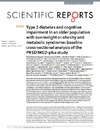Identificador persistente para citar o vincular este elemento:
https://accedacris.ulpgc.es/jspui/handle/10553/42533
| Título: | Type 2 diabetes and cognitive impairment in an older population with overweight or obesity and metabolic syndrome: baseline cross-sectional analysis of the PREDIMED-plus study | Autores/as: | Mallorqui-Bague, Nuria Lozano-Madrid, Maria Toledo, Estefania Corella, Dolores Salas-Salvado, Jordi Cuenca-Royo, Aida Vioque, Jesus Romaguera, Dora Alfredo Martinez, J. Warnberg, Julia Lopez-Miranda, Jose Estruch, Ramon Bueno-Cavanillas, Aurora Alonso-Gomez, Angel Tur, Josep A. Tinahones, Francisco J. Serra-Majem, Lluis Martin, Vicente Lapetra, Jose Vazquez, Clotilde Pinto, Xavier Vidal, Josep Daimiel, Lidia Gaforio, Jose J. Matia, Pilar Ros, Emilio Granero, Roser Buil-Cosiales, Pilar Barragan, Rocio Bullo, Monica Castaner, Olga Garcia-de-la-Hera, Manoli Yanez, Aina M. Abete, Itziar Garcia-Rios, Antonio Ruiz-Canela, Miguel Diaz-Lopez, Andres Jimenez-Murcia, Susana Martinez-Gonzalez, Miguel A. De la Torre, Rafael Fernandez-Aranda, Fernando |
Clasificación UNESCO: | 3206 Ciencias de la nutrición | Palabras clave: | Executive Function Mellitus Decline People Risk |
Fecha de publicación: | 2018 | Editor/a: | 2045-2322 | Proyectos: | Efecto de la Dieta Mediterránea Hopocalórica y Promoción de la Actividad Física en Prevención Primaria Cardiovascular.Estudio Piloto Sobre Marcadores Intermedios. Efecto de Una Pérdida de Peso Con Dieta Mediterránea Hipocalórica y Promoción de la Actividad Física en la Prevención Primaria Cardiovascular Neuroprotección Por Bloqueo de la Capacidad de Transactivadora Nf-Kb y Factores Relacionados. |
Publicación seriada: | Scientific Reports | Resumen: | This study cross-sectionally examines in the elderly population: (a) the association of type 2 diabetes with executive function (EF); (b) the effect of BMI on both type 2 diabetes and EF; (c) the association between glycaemia control and EF in type 2 diabetes. 6823 older individuals with overweight/obesity and metabolic syndrome participating in the PREDIMED-PLUS study, were assessed with a battery of cognitive tests and a medical interview. ANOVA showed a significantly worse performance on EF in type 2 diabetes vs. non-diabetic individuals. Two complementary models were displayed: (1) in the whole sample, the presence of type 2 diabetes, depressive symptoms and BMI had a direct negative effect on EF, while apnoea had an indirect negative effect; (2) in the diabetes subsample, higher illness duration was associated with worse performance in EF. Participants with type 2 diabetes and HbA1c<53 mmol/mol displayed better cognitive performance when compared to those with HbA1c >= 53 mmol/mol. Our results provide a controlled comprehensive model that integrates relevant neuropsychological and physical variables in type 2 diabetes. The model suggests that, to improve treatment adherence and quality of life once diabetes has been diagnosed, cognitive decline prevention strategies need to be implemented while monitoring depressive symptoms, BMI and glycaemia control. | URI: | https://accedacris.ulpgc.es/handle/10553/42533 | ISSN: | 2045-2322 | DOI: | 10.1038/s41598-018-33843-8 | Fuente: | Scientific Reports [ISSN 2045-2322], v. 8, article number 16128, (Octubre 2018) |
| Colección: | Artículos |
Citas SCOPUSTM
71
actualizado el 08-jun-2025
Citas de WEB OF SCIENCETM
Citations
73
actualizado el 01-mar-2026
Visitas
255
actualizado el 15-ene-2026
Descargas
195
actualizado el 15-ene-2026
Google ScholarTM
Verifica
Altmetric
Comparte
Exporta metadatos
Los elementos en ULPGC accedaCRIS están protegidos por derechos de autor con todos los derechos reservados, a menos que se indique lo contrario.
